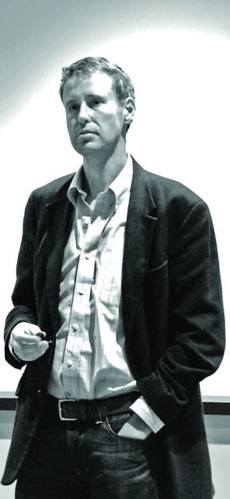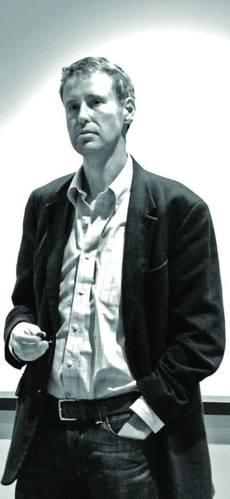
(Stephen Anunson)
Lawrence alumnus, author and human rights activist Tom Zoellner gave a lecture entitled “The Importance of Being Unpopular (at Lawrence)” last Tuesday night, April 27, in the Warch Campus Center Cinema. Lawrence’s chapter of Amnesty International hosted the event. The talk focused on what Zoellner perceives to be problems with the social environment at Lawrence and was followed by a question and answer session.
“The most important lessons I learned here were lessons I learned in spite of Lawrence,” Zoellner said. He also included the disclaimer, “This is not a motivational speech. I only want to inspire thought about how you can get the best possible education at Lawrence.”
Zoellner focused on the concept of the “Lawrence Bubble” for a large portion of his lecture. He argued that the “bubble” is much more permeable than we think.
Zoellner discussed a “profound [social] conservatism” that pervades both Wisconsin and Lawrence communities. He described a “modesty of spirit” and a belief in “the authority of the existing order” that is deeply ingrained in Wisconsin but is not effective for a productive college campus.
Zoellner stated, “[Lawrentians] will out-work anybody, but we should question our reverence for authority.”
When asked whether he could really draw such conclusions about Wisconsin’s influence on Lawrence when students come from such diverse places, Zoellner held that there is “a collective unconscious at Lawrence that lacks robustness.” Ideally, according to Zoellner, Lawrence should create a much more self-contained environment free of conservative influences.
“Lawrence prepares us very well to analyze,” Zoellner stated, “but does it prepare us to speak, to revolt?”
Zoellner continually emphasized the need for a “revolt against established ways of thinking” as the only way to bring about real change.
He criticized Lawrence students’ aversion to taking risks, something he observed around campus. Zoellner finds this aversion ironic because he considers the decision to attend college at Lawrence a big risk.
Zoellner contended that there is a serious social and economic handicap in spending one’s college years here since Lawrence is not nationally recognized and tuition rates are high. However, Zoellner argued that there is a sense on campus that it is wrong to dissent, which has created a “shamefully bland” environment.
Using the actions of Paul Rusesabagina as portrayed in “Hotel Rwanda” as an example, Zoellner said, “Rebellion against accepted norms can be the highest form of humanity.”
Zoellner believes that Lawrence denies its students the opportunity to go as far as possible in their pursuit of knowledge and that there is not enough emphasis placed on the value of “creative disagreement.”
“Being an effective force for positive change and an effective agent for social justice requires first that you find your voice,” said Zoellner.
Zoellner concluded his lecture by advising students, “Do not accept mediocrity from Lawrence and do not extinguish that questioning spark.

(Stephen Anunson)
